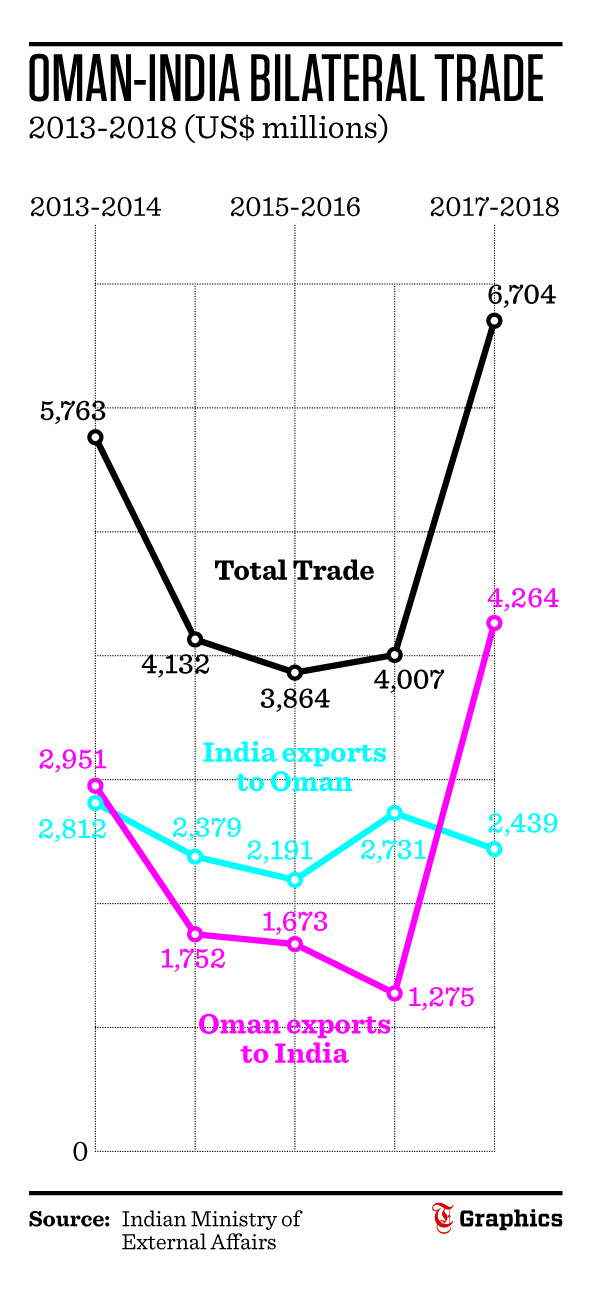
Muscat: The total volume of trade between Oman and India has increased by nearly a billion dollars in the last five years, data from the country’s Ministry of External Affairs has shown.
As India celebrates its 70th Republic Day, data shows that the value of bilateral trade between India and Oman for the financial year 2017-18 was $6.703 billion (OMR2.58 billion), up from $5.763 billion (OMR2.218 billion) for the year 2013-14, reflecting an increase of $940.31 million (OMR361.87 million)
**media[995893]**
During this period, the value of exports from India to Oman rose from $2.812 billion to $2.439 billion, but the value of imports from Oman to India rose sharply from $2.951 billion to $4.264 billion.
“We have had a series of high-level exchanges,” said Munu Mahawar, India’s ambassador to Oman. “Our Minister of Commerce and Industry visited Oman, the Minister Responsible for Defence Affairs visited India; so all these exchanges have helped us move forward with the implementation of key decisions. On an economic front, we have seen many positive developments.”
He added, “There have been several announcements regarding investments in Oman; you would have noticed that Indian companies are already among the leading investors in Sohar and Salalah, and I have seen that there is a renewed interest among these companies to take advantage of the opportunities being offered in Duqm. A high-level delegation from Oman also participated in the Vibrant Gujarat summit, to look at opportunities for enhanced engagement.”
Net trade dipped from $5.76 billion in 2013-14 to $4.13 billion in 2014-15, before falling again to $3.86 billion for 2015-16. It then rose to $4.006 billion in 2016-17, before jumping sharply to $6.703 billion in 2017-18, which corresponded with a big rise in exports from Oman to India. Major items of India’s exports to Oman include mineral fuels, mineral oils and products of their distillation, boilers, machinery and mechanical appliances, articles of iron or steel, electrical machinery and equipment, textiles and garments, chemicals, tea, coffee, spices, cereals, meat products and seafood.
The main items of India’s imports from Oman include fertilisers, mineral fuels, mineral oils and products of their distillation, bituminous substances, mineral waxes, aluminium and organic chemicals, salt, sulphur, earth and stone, plastering materials, lime and cement.
In addition, Ramanuj Venkatesh, a financial analyst from India with experience in both Oman and the UAE, said Indians had played an integral role in aiding Omanis develop their economy, and would continue to remain a strong partner of the country, as the Sultanate actively pursued a policy of Omanisation, as well as economic expansion, under the Tanfeedh plans for economic diversification.
“Indian migrants have been integral to not just the development of the Omani economy and infrastructure, but the rest of the GCC countries as well, working hand-in-hand with the local work forces in these countries to identify and fill in the gaps present, while simultaneously training local work forces to take over these jobs in the future,” said Venkatesh.
He added, “There has been a long history of Indian expatriate workers in countries such as Oman, where they are now a very valued part of the local community. Indians have worked across multiple fields, including medicine, education, scientific research, finance, banking and so many others, apart from many jobs in the construction, logistics, transportation and service sector industries.”
PK Subudhi, the general manager for Mustafa Sultan Exchange, said Indian companies had a long history of trading in Oman, and joint ventures between Indian organisations and Omani companies formed an integral part of the Sultanate’s economic development.
“Many people know that the history of trade between Oman and India dates back hundreds of years, and one of the reasons for this is that once you leave India and head towards the Middle East, Oman is the first country you come across; so in the region, Oman is one of the nearest trading partners that India has,” he told the Times of Oman.
“There are many things that Oman needs from India, and the reverse is true as well, and the relations between Oman and India have only grown stronger over time.”
Expertise
“I think that with the Omani economy now looking to expand, there will be many Indian organisations offering their expertise in places such as Sohar, Salalah and Duqm, where there are so many plans coming up,” added Subudhi.
“There are many areas where India can help, such as engineering, manufacturing, tourism and shipping and I am confident Oman will benefit from the long-term investment that Indian companies have in the country.”